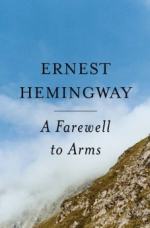|
|
A Farewell to Arms Chapter 9
The road is screened with vegetation and Fred can see the Austrian observation balloons. He gets his orders from the major. Nearby, a bridge is to be built for the soldiers to cross. Fred is promised decoration if it is successful. He drinks rum with the major and other officers and then returns and shares cheap cigarettes with his drivers. They are worried about driving the trucks during combat, but they are more concerned about when they are going to eat and whether or not it will be before the battle. Fred discovers that a stew will be brought around. Manera says he hoped it would come before the bombing started. They smoke in their dugout and talk about the battle making distinctions of valor based on regional ethnicity. This region is foolish, these people are cowards, etc. They talk about the conflict and the drivers speak irreverently of the government, but Fred doesn't mind. One of the drivers, Passini, suggests that they stop fighting altogether. Fred replies:
"I believe we should get the war over. . .It would not finish if one side stopped fighting. It would only be worse if we stopped fighting." Chapter 9, pg. 49
They continue to discuss war and Fred says that defeat is the only thing worse than war. Passini doesn't agree and thinks that everyone should defend their own home because there is nothing as bad as war, and there is no end to it. According to Passini: "War is not won by victory." Chapter 9, pg. 50 Fred calls him an orator, but Passini says that he merely thinks and reads. He blames war on the upper class. Manera cautions him to stop. Most of the men in the dugout think that the war is useless and cannot be won. It is dark outside as searchlights scan the mountains. The attack is at first delayed, but then begins. The sound of gun shell bursts is nearby. Fred runs and gets some pasta shells and cheese to feed his drivers from the officers' tent where the major has already begun to tend to the wounded.
He makes it back to the dugout and shares the food. Fred does not need to mention how strange it is that they sit down to eat a meal while the shells explode around them. The war rages on, but the fundamental aspects of life must continue. They wash the meal down with some spoiled wine and talk a lot about what sort of guns might be in use.
"I ate the end of my piece of cheese and took a swallow of wine. Through the other noise I heard a cough, then came the chuh-chuh-chuh-chuh- then there was a flash, as when a blast-furnace door is swung open, and a roar that started white and went red and on and on in a rushing wind." Chapter 9, pg. 54
After the shell hits, there is chaos. He tries to put a tourniquet on Passini's legs but Passini is soon dead. Fred looks around for others as he realizes that he himself is badly wounded in the knees. Some men come to help him and he hears that Manera is all right. They drop Fred once and take him to where the wounded and dead are separated. There is chaos everywhere. There is so much dirt and debris in his knee that there is no hemorrhaging. A British man comes over to him and offers a cigarette. Fred gives the command of his cars over to the British man, Gordini, who is wounded in the shoulder and head.
As they go to the surgeon's tent, the British man exaggerates Fred's importance, calling him the only son of the U.S. ambassador and the son of President Wilson. Fred is wounded badly with "multiple superficial wounds of the left and right thigh and left and right knee and right foot. Profound wounds of right knee and foot." Chapter 9, pg. 59. He also sustained a head injury. The major talks to him and gives him brandy, but then takes it back because his skull might be fractured. He says that Fred will survive and sends him on his way to a camp hospital. In the ambulance the man in the bunk above him is hemorrhaging and the blood drips down on him. He passes out.




